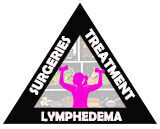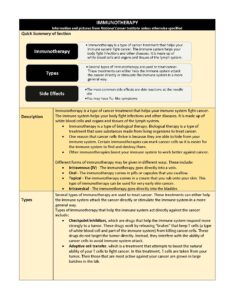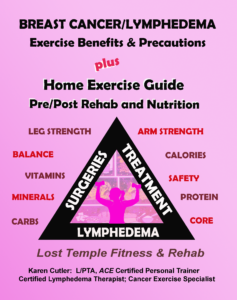What is
Immunotherapy
Your Body is Your Temple
Research, Resources & Education
Table of Contents
Immunotherapy is a type of cancer treatment that helps your immune system fight cancer. The immune system helps your body fight infections and other diseases. It is made up of white blood cells and organs and tissues of the lymph system.
Information from the National Cancer Institute unless otherwise specified
Immunotherapy in Cancer Treatments
Biological Therapy
Mark Cancer Cells
Boost the Immune System
Immunotherapy Videos
YouTube Videos that help explain types of Immunotherapy for Cancer.
Disclaimer:
This is for research only and Lost Temple Fitness & Cancer does not endorse any video presented on this website.
It is advised that you ALWAYS CHECK WITH YOUR PHYSICIAN for a proper diagnosis and treatment plan.
Immunotherapy
Ways that Immunotherapy can be Administered
Intravenous (IV)
Oral
Topical
Intravesical
Types of Immunotherapy
Several types of immunotherapy are used to treat cancer. These treatments can either help the immune system attack the cancer directly or stimulate the immune system in a more general way.
Types of immunotherapy that help the immune system act directly against the cancer include:
- Drugs that help the immune system respond more strongly to a tumor.
- These drugs work by releasing “brakes” that keep T cells (a type of white blood cell and part of the immune system) from killing cancer cells.
- These drugs do not target the tumor directly. Instead, they interfere with the ability of cancer cells to avoid immune system attack.
A treatment that attempts to boost the natural ability of your T cells to fight cancer. In this treatment, T cells are taken from your tumor. Then those that are most active against your cancer are grown in large batches in the lab.
These are immune system proteins created in the lab. These antibodies are designed to attach to specific targets found on cancer cells.
- Some monoclonal antibodies mark cancer cells so that they will be better seen and destroyed by the immune system.
- Other monoclonal antibodies directly stop cancer cells from growing or cause them to self-destruct.
- Still others carry toxins to cancer cells.
- Because therapeutic monoclonal antibodies recognize specific proteins on cancer cells, they are also considered targeted therapies.
These work against cancer by boosting your immune system’s response to cancer cells. Treatment vaccines are different from the ones that help prevent disease.
Types of immunotherapy that enhance the body’s immune response to fight the cancer include:
Proteins made by your body’s cells. They play important roles in the body’s normal immune responses and also in the immune system’s ability to respond to cancer.
- The two main types of cytokines used to treat cancer are called interferons and interleukins.
An immunotherapy that is used to treat bladder cancer. It is a weakened form of the bacteria that causes tuberculosis. When inserted directly into the bladder with a catheter, BCG causes an immune response against cancer cells.
Side Effects
The most common side effects are skin reactions at the needle site. These side effects include:
- Pain, Soreness
- Swelling
- Redness, Itchiness, Rash
You may have flu- like symptoms, which include:
- Fever, Chills
- Weakness, Dizziness
- Nausea or vomiting
- Muscle or joint aches
- Fatigue
- Headache
- Trouble breathing
- Low or high blood pressure
Other side effects might include:
- Swelling and weight gain from retaining fluid
- Heart palpitations
- Sinus congestion
- Diarrhea
- Risk of infection
- White blood cell counts – Avoid public gyms unless blood cell count is above 500 mm
(CETI: Cancer Exercise Training Institute)
Immunotherapies rarely cause severe or even fatal allergic reactions.
Disclaimer: The information in this book/website is for educational purposes only and has been obtained through research, publications and personal experience, and shall not be liable for incorrect information. Any mentioned publications or websites does not imply endorsement. As this industry is ever changing, I urge readers to confirm the information contained in this book/website. The author will not be liable for any injuries sustained from practicing techniques taught or for any typographical errors or omissions.
It is advised that you always check with your medical doctor or physical therapist before starting an exercise program or change in diet.
|
Information and pictures from National Cancer Institute unless otherwise specified |



